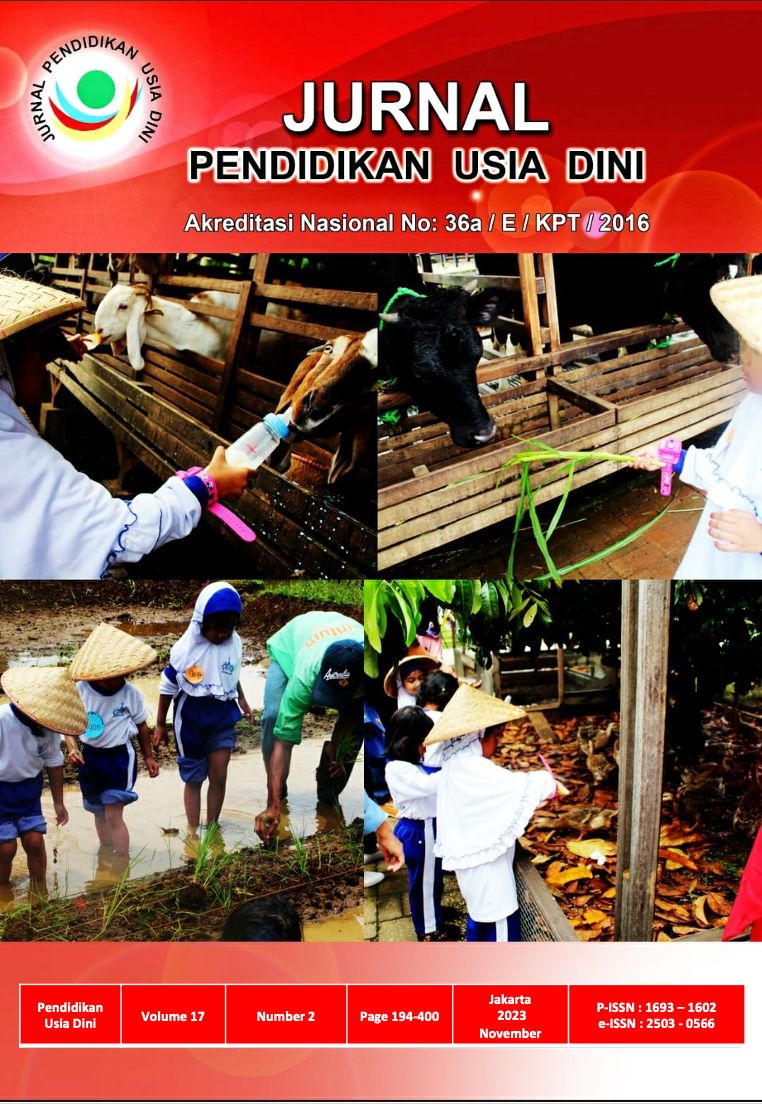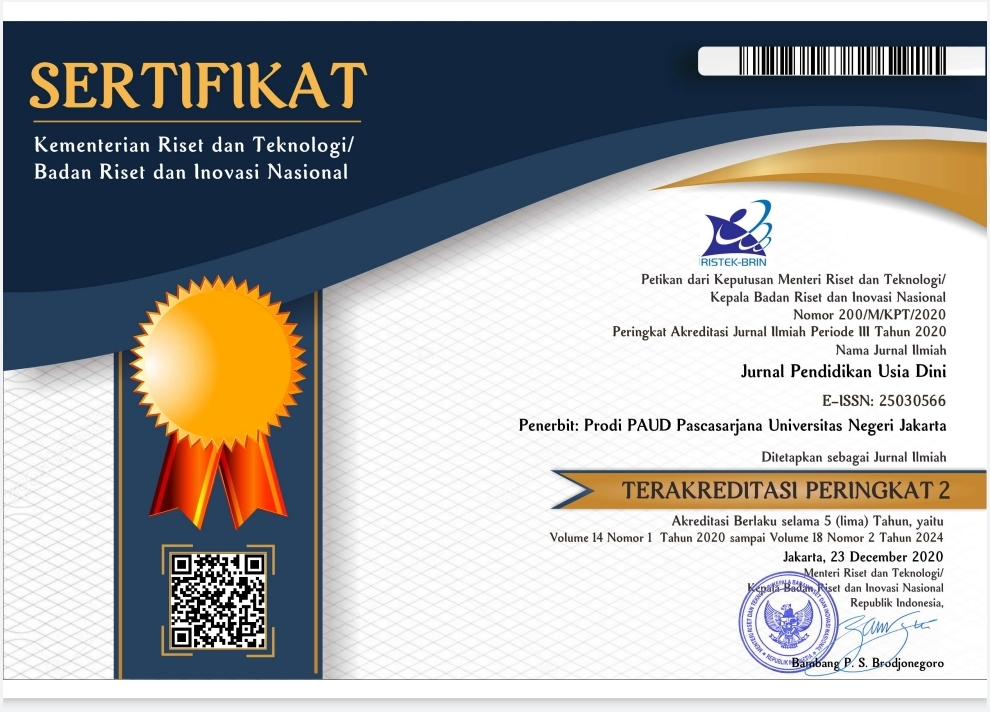Validity Test of the Locomotor Learning Model in Children Aged 6-8 Years
DOI:
https://doi.org/10.21009/JPUD.172.07Abstract
The locomotor learning model for early childhood developed in Indonesia is still not innovative. Therefore, researchers intend to develop an innovative locomotion learning model. This research aims to obtain the validity of the locomotor movement learning model to improve locomotor movement in children aged 6-8 years. The validation data collection method used Focus Group Discussion (FGD) by 5 experts. The validity of the learning model is assessed based on content and construct validity. The content and construct validation results through expert FGDs show that the locomotor learning model for children aged 6-8 years is included in the very valid category. These findings suggest that, theoretically, it is sound and may be used to help kids between the ages of six and eight develop their locomotor skills. Researchers' locomotor movement learning model offers tremendous potential for academics and practitioners to conduct more studies based on its construct validity and content results. One area that warrants further investigation is the applicability and efficacy of the locomotor movement learning model for 6–8-year-old children.
Keywords: locomotor learning model, Children 6-8 years
References:
Alawiyah, N., & Attamim, N. (2020). The Development of Fine Motor and Visual Motor Skills of Children 4-5 Years Old to Get Ready Write. JECIES: Journal of Early Childhood Islamic Education Study, 1(1), 15-33. doi:https://doi.org/10.33853/jecies.v1i1.52
Andriyani, F. D., Biddle, S. J. H., Arovah, N. I., & de Cocker, K. (2020). Physical activity and sedentary behavior research in Indonesian youth: A scoping review. International Journal of Environmental Research and Public Health, 17(20), 1–15. https://doi.org/10.3390/ijerph17207665
Bunketorp Käll, L., Malmgren, H., Olsson, E., Lindén, T., & Nilsson, M. (2015). Effects of a Curricular Physical Activity Intervention on Children’s School Performance, Wellness, and Brain Development. Journal of School Health, 85(10), 704–713. https://doi.org/10.1111/josh.12303
Dewolf, A. H., Sylos Labini, F., Ivanenko, Y., & Lacquaniti, F. (2021). Development of Locomotor-Related Movements in Early Infancy. Frontiers in Cellular Neuroscience, 14. https://doi.org/10.3389/fncel.2020.623759
Darni & Gusti Handayani. (2020). Development of Motor Learning Model Based on Game and Fun Activities. Proceedings of the 1st Progress in Social Science, Humanities and Education Research Symposium (PSSHERS 2019), 398–401. https://doi.org/10.2991/assehr.k.200824.09
Eddy Marheni, Firunika Intan Cahyani, & Eko Purnomo. (2021). Implementation of Motor Learning on Social Skills in Children. Proceedings of the 1st International Conference on Sport Sciences, Health, and Tourism (ICSSHT 2019), 83–87. https://doi.org/10.2991/ahsr.k.210130.016
Human, department oh health and, & Services. (2016). Physical activity guidelines for Americans 2nd edition. The Oklahoma Nurse, 53(4), 25. https://doi.org/10.1249/fit.0000000000000472
Janssen, I., & LeBlanc, A. G. (2010). Systematic review of the health benefits of physical activity and fitness in school-aged children and youth. International Journal of Behavioral Nutrition and Physical Activity, 7. https://doi.org/10.1186/1479-5868-7-40
Michel, J., Bernier, A., & Thompson, L. A. (2022). Physical Activity in Children. JAMA Pediatrics, 176(6), 622. https://doi.org/10.1001/jamapediatrics.2022.0477
Sari, E. F. N., Sujarwo, & Sukiri, S. (2019). Basic Locomotor Movement of First Grade Students of Elementary School. Proceedings of the 5th International Conference on Physical Education, Sport, and Health (ACPES 2019). Proceedings of the 5th International Conference on Physical Education, Sport, and Health (ACPES 2019), Semarang, Indonesia. https://doi.org/10.2991/acpes-19.2019.42
Sullivan, K. J., Kantak, S. S., & Burtner, P. A. (2008). Motor learning in children: feedback effects on skill acquisition. Physical therapy, 88(6), 720–732. https://doi.org/10.2522/ptj.20070196
Syafril, S., Susanti, R., Fiah, R. E., Rahayu, T., Pahrudin, A., Yaumas, N. E., & Ishak, N. M. (2018). Four Ways of Fine Motor Skills Development in Early Childhood. https://doi.org/10.31227/osf.io/pxfkq
Tomaczkowski, L., & Klonowska, J. (2020). Physical activity of school children and youth. Baltic Journal of Health and Physical Activity, 12(2), 83–87. https://doi.org/10.29359/bjhpa.12.2.09
Downloads
Published
How to Cite
Issue
Section
License
JURNAL PENDIDIKAN USIA DINI work is licensed under a Creative Commons Attribution 4.0 International License. (http://creativecommons.org/licenses/by/4.0/)





